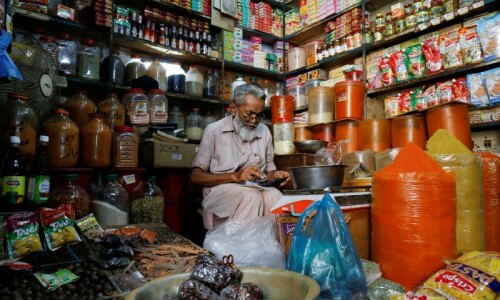Despite divergent views and apparent distrust, as evident from public pronouncements during stretched negotiations on the resumption of the International Monetary Fund (IMF) programme, both Pakistan and the IMF staff remain engaged. That the negotiations are not breaking down indicates that the clinching of a deal would be the best option for both sides.
With the next IMF tranche of $1.2 billion, Pakistan’s risks to default in foreign debt payments could be somewhat reduced for a while. One cannot expect the IMF and the country’s trading and investment partners to assist Pakistan in living beyond its means. But they need to at least provide debt relief in a variety of ways to avoid default, without, as far as possible, increasing the country’s overall debt level.
The IMF should also appreciate that, to avoid default, Pakistan’s external financing gap has been substantially bridged. The current account deficit was slashed by over 80 per cent to $2.94bn in 11 months of FY23 (owing to a lower import bill) from $15.6bn in the same period of the last fiscal year.
This has come at a heavy loss in manufacturing output, exports, remittances and increased unemployment and poverty. With foreign exchange reserves at very low levels, foreign firms have not been allowed to send, reportedly, at least $1bn of profits/dividends outside the country.
Amid reassurances of self-sufficiency and an expansionary budget, the govt continues to engage the IMF for the $1.2bn tranche
A default, if it occurs, has the potential to further disrupt Pakistan’s international trade and bilateral economic ties, which are already hit by import curbs, falling exports of merchandise and donor fatigue.
Pakistan’s economy will sink deeper into the quagmire and its ripples will be felt in the global market segments where the country has some presence. That is the last thing the IMF should look forward to because it is supposed to ensure global financial stability.
Pakistan has no option but to get IMF on board. Reiterating that with or without the IMF, Pakistan would not default, Finance Minister Ishaq Dar said there is “nothing to worry about” and “everything is arranged.” Yet the finance ministry is engaged with the IMF “in the interest of the country”.
Prime Minister Shahbaz Sharif made what is seen as a last-ditch effort to salvage the IMF deal and secure at least a $1.2bn tranche by seeking the support of influential countries in a meeting with their ambassadors in Islamabad on June 19.
Uzair Younus, a senior official working with a Washington-based think tank, recently said: “There is no way that China will walk back from Pakistan at this time.” However, according to analyst Dr Imran Khalid, Beijing believes that the IMF’s lending was crucial in reducing Pakistan’s risk of default.
Pakistan is not on the agenda for IMF Board meetings scheduled for the end of this month, but it can be added in the event of a prior staff-level agreement.
While Pakistan can be blamed for delaying needed structural reforms, the IMF needs to show some flexibility given unforeseen developments such as huge losses caused by super floods and recurring external shocks the country has continuously suffered.
While formulating its policies, the IMF may consider a recent World Bank report which says: “Nearly all the economic forces that powered progress and prosperity over the last three decades are fading… not only in the case of some countries or regions but the whole world.”
Eminent US scholar Dani Rodrik believes that globalisation, by its very nature, is disruptive. In his scholarly works, he explains how countries can help the global economy take a correction course by pursuing their own economic policy agendas.
Professor of Global Economic Governance at Oxford University Ngaire Woods says free trade is taking a backseat due to powerful nations’ politics, hurting developing economies.
The stretched global supply chains, whether for raw materials or finished products, are turning costlier and more difficult to manage for transnational corporations. As part of its ‘simplifying’ the global portfolio, Shell Pakistan announced that its foreign sponsor is planning to sell its entire 77.4pc shareholding in the company and 26pc stakes in Pak-Arab Pipeline Company Ltd.
Shell Pakistan posted a net loss of Rs4.7bn in January-March against a profit of Rs21bn a year ago, attributing the negative bottom line to devaluation, inflation and macroeconomic uncertainty.
However, unveiling the ‘Economic Revival Plan’ on June 20, the prime minister asserted that “export-oriented foreign direct investment was the key to the country’s economic revival.”
Pakistan has a long history of relying on external sources for policies and development, says Durre Nayab, Pro Vice-Chancellor of the Pakistan Institute of Development Economics (PIDE). This has hindered our ability to progress as a nation and limited our autonomy. But it does not have to be that way.
We can take control of our destiny and make policies that benefit our people. The eminent scholar was addressing a conference jointly organised by the Pakistan Society of Development Economics and PIDE.
In its first session on ‘Current Crisis and Charter of Economy’, the participants emphasised the need to re-evaluate systems and policies and explored ideas to pave the way for a stronger, more independent and self-sufficient Pakistan.
However, the budget FY24 is generally perceived as fiscally expansionary and the targeted increase in exports and remittances is seen as unlikely to be realised. In this scenario, can the risk of default be reduced without IMF support?
Extract: In just 11 months the current account deficit fell from $15.6bn to $2.49bn but only after heavy losses in manufacturing output, exports, remittances and increased unemployment and poverty.
Published in Dawn, The Business and Finance Weekly, June 26th, 2023















































Dear visitor, the comments section is undergoing an overhaul and will return soon.